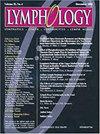Physical therapy affects endothelial function in lymphedema patients.
IF 0.7
4区 医学
Q4 IMMUNOLOGY
引用次数: 6
Abstract
Lymphedema arises due to a malfunction of the lymphatic system and can lead to massive tissue swelling. Complete decongestive therapy (CDT), consisting of manual lymphatic drainage (MLD) and compression bandaging, is aimed at mobilizing fluid and reducing volume in affected extremities. Lymphatic dysfunction has previously been associated with chronic inflammation processes. We investigated plasma ADMA as an indicator of endothelial function/inflammation before-, during- and after-CDT. Also assessed were vascular function parameters such as carotid-femoral pulse wave velocity (PWVcf), flow-mediated dilata-tion (FMD) and retinal microvasculature analysis. 13 patients (3 males and 10 females, 57 ± 8 years old (mean ± SD), 167.2 ± 8.3 cm height, 91.0 ± 23.5 kg weight), with lower limb lymphedema were included. Vascular function parameters were assessed on day 1, 2, 7, 14 and 21 of CDT, pre- and post-MLD. ADMA was significantly lower post-MLD (p=0.0064) and tended to reduce over three weeks of therapy (p=0.0506). PWVcf weakly correlated with FMD (r=0.361, p=0.010). PWVcf, FMD and retinal microvasculature analysis did not show changes due to physical therapy. The novel results from this study indicate that lymphedema does not affect endothelial func-tion and lymphedema patients may therefore not have a higher risk of cardiovas-cular diseases. Our results further suggest that manual lymphatic drainage with or without full CDT could have potentially beneficial effects on endothelial function in lymphedema patients (by reducing ADMA levels), which has not been reported previously.物理治疗影响淋巴水肿患者的内皮功能。
淋巴水肿的出现是由于淋巴系统的故障,并可导致大量的组织肿胀。完全减充血性治疗(CDT),包括手动淋巴引流(MLD)和压缩包扎,旨在调动液体和减少患肢体积。淋巴功能障碍以前与慢性炎症过程有关。我们研究了血浆ADMA作为cdt前、中和后内皮功能/炎症的指标。同时还评估了血管功能参数,如颈-股脉波速度(PWVcf)、血流介导扩张(FMD)和视网膜微血管分析。患者13例,男3例,女10例,年龄57±8岁(平均±SD),身高167.2±8.3 cm,体重91.0±23.5 kg),伴有下肢淋巴水肿。分别于CDT第1、2、7、14、21天及mld前后评估血管功能参数。mld后ADMA显著降低(p=0.0064),并且在治疗三周后趋于降低(p=0.0506)。PWVcf与FMD呈弱相关(r=0.361, p=0.010)。PWVcf、FMD和视网膜微血管分析未显示物理治疗引起的变化。这项研究的新结果表明,淋巴水肿不影响内皮功能,因此淋巴水肿患者可能没有更高的心血管疾病风险。我们的研究结果进一步表明,手工淋巴引流有或没有充分CDT可能对淋巴水肿患者的内皮功能有潜在的有益影响(通过降低ADMA水平),这在以前没有报道过。
本文章由计算机程序翻译,如有差异,请以英文原文为准。
求助全文
约1分钟内获得全文
求助全文
来源期刊

Lymphology
医学-免疫学
CiteScore
5.20
自引率
8.00%
发文量
29
审稿时长
3 months
期刊介绍:
The Journal contains original articles, special features (see below), and information regarding the International Society of Lymphology. It seeks original papers dealing with clinical and basic studies of the lymphatic system and its disorders including related fields. Articles are accepted for external review and publication on the condition that they are contributed to Lymphology only and that no substantial part has been or will be published elsewhere.
 求助内容:
求助内容: 应助结果提醒方式:
应助结果提醒方式:


